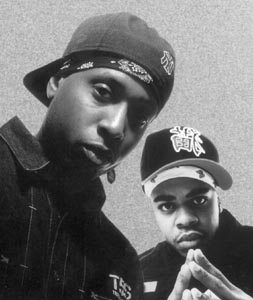![[MetroActive Music]](/gifs/music468.gif)
[ Music Index | Santa Cruz | MetroActive Central | Archives ]
Photograph by Anders Jones
Talking Truth
Underground hip-hop artist Talib Kweli takes rap in new direction
By Louise Brooks
LIKE MOST intelligent artists, Brooklyn rapper Talib Kweli doesn't really like people trying to define him and his work, but he understands the impulse.
"People have to put stuff in a box. Especially the media. The media has to work with angles to create a story. They say, 'This is a conscious, positive, activist rapper,' " says Kweli in a phone interview from his hotel room in North Carolina.
So what does 24-year-old Talib Kweli do that causes writers to start messing around with sloppy labels and attempts at definition? He makes us think.
Kweli first surfaced in 1997 with a quick hit, "Fortified Live." Then, in 1998, Kweli joined up with Mos Def to create Black Star, an album that was hugely loved and critically acclaimed. Here were a couple of Brooklynites bringing back lyricism, social consciousness and spiritual awareness to a hip-hop world obsessed with death, violence and money. And they sounded better than anyone else.
Critics and fans loved the fact that Mos Def and Kweli were cocky, not just because they could easily tear down commercial hip-hop targets, but because they were sure of what they had to offer in return.
"I think the Black Star album wasn't so much a critique of the current state of hip-hop as it was a celebration of what was going on that wasn't being acknowledged," Kweli says.
Kweli's latest album, Reflection Eternal, has this same sense of celebrating a style that is still fresh and exciting to the people making it. Kweli joined up again with DJ Hi Tek (his collaborator on "Fortified Live") to make the album. He describes Hi Tek's style as "rugged and melodic; it's real hip-hop, but it's very musical at the same time."
Lyrically, Kweli is still crafting songs that feel like complete thoughts, finished stories. His mind stays focused, rather than slipping into the restless freestyling that leaves a lot of other hip-hop without real content.
KWELI BELIEVES that artists have a responsibility "to give people something to think about. To spread whatever information you have. If you know about self-knowledge, if you know about some gangster shit, whatever information you have, your job is to spread it in some form or fashion."
Kweli often takes his critiques of society, culture and certain elements of hip-hop further than most rappers. In the song "Thieves in the Night," from Black Star, he reworks a passage from Toni Morrison's novel The Bluest Eye to comment on oppression in America. He and Mos Def end up in a give-and-take refrain:
Kweli explains, "I was talking about the tendency of the oppressed to imitate the oppressor, because sometimes that seems like the most reasonable road to freedom. And hip-hop as a black art form and as a popular art form takes the characteristics of the main society--the materialism, the capitalism, the greed, the violence--and adds its own flavor to it."
As sharp as his insights are, Kweli is quick to move away from a critical stance. He is one of a very few artists who have not only the brains to point out our problems but the heart to want to push us to find a way out. On both his albums, he unabashedly meditates on love, compassion and spiritual growth.
"I don't think I'm any more or less spiritual than anybody else out there, I just make a choice to deal with it in my music. I think most people my age are going through some sort of spiritual transformation, or some sort of spiritual awareness, and whether or not they're making music about it is a different story.
"But I think that everyone is right there and thinks about their relationship with God in some way, form or fashion. I think any revolution, any change, is going to have to come personally from people that decide to do it for themselves."
How does Kweli know when he's speaking from the place of honesty that he expects from himself and other artists?
"You never completely get it, but you know when you feel it ... when the pure art is just filtering through you, that's when you know that you're being honest with your craft. Those are the times when the artist is doing that, that the rest of the audience is feeling it--sort of like, 'Whoa! I have to stand up, I have to clap.'"
[ Santa Cruz | MetroActive Central | Archives ]
Copyright © Metro Publishing Inc. Maintained by Boulevards New Media.
![]()
 Extra Fortified: MC Talib Kweli and DJ Hi-Tek's new album, 'Reflection Eternal,' showcases their brand of thinking person's hip-hop.
Extra Fortified: MC Talib Kweli and DJ Hi-Tek's new album, 'Reflection Eternal,' showcases their brand of thinking person's hip-hop.
Not strong/only aggressive
Not free/we only licensed
Not compassionate, only polite/Now who the nicest?
Not good but well behaved/Chasing after death so we can call ourselves brave?
Still living like mental slaves
Hiding like thieves in the night from life
Illusions of oasis making you look twice.
Talib Kweli performs with Jack Herere and Mad Skills Sunday (March 11) at 9pm at Palookaville, 1133 Pacific Ave., Santa Cruz. Tickets are $15/adv, $16/door. All ages. (454.0600)
From the March 7-14, 2001 issue of Metro Santa Cruz.